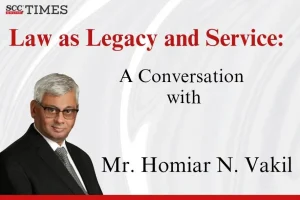“Litigation was once limited in volume but very high in quality—both in terms of the cases and the standard of advocacy.”
1. Please introduce yourself to our readers.
I am Homiar N. Vakil. I am admitted as an Advocate with the Bar Council of Maharashtra and Goa since 1981, further I am qualified as a Solicitor and Member of the Bombay Incorporated Law Society since 1984, and as a Solicitor of the Supreme Court of England & Wales (non-practising) since 1986. In 2015, I was also appointed as a Notary Public of the Union of India.
2. Could you share what inspired you to pursue a career in law, and how your educational journey at Burhani College and Government Law College, Mumbai, shaped your legal perspective?
My grandfather and uncle were both in the legal profession, and even my surname, “Vakil”, reflects our family’s deep-rooted association with law. This legacy inspired me to pursue a legal career. I began my journey by training under a criminal lawyer, which gave me a strong foundation in litigation, and later joined Mulla & Mulla as an articled clerk to gain structured experience in the profession.
3. You have been associated with Mulla & Mulla since 1984, a firm with over a century of legacy. How do you see your role in preserving tradition while steering the firm through modern legal challenges?
Mulla & Mulla has always stood on the pillars of honesty, integrity, and strong ethical values, and I consider it both a privilege and a responsibility to uphold these principles. Having been with the firm since 1984, I have witnessed its legacy firsthand. As a trainee, I had the opportunity to see eminent personalities such as the Nawab of Pataudi and leading industrialists like Mahendra Goenka and Members of the Tata family walk through our doors. The responsibility of carrying forward such a rich legacy is immense, and I strive every day to preserve the firm’s traditions while adapting to the evolving demands of the modern legal landscape.
4. You have appeared regularly before the Bombay High Court. How would you describe the evolution of practice before the High Court over the last four decades in terms of advocacy, judicial temperament, and procedure?
When I began my practice in 1984, the Judges of the Bombay High Court were known for their proactive approach and sharp judicial acumen. Litigation at that time was comparatively limited in volume but very high in quality — both in terms of the cases brought before the Court and the standard of advocacy. Over the years, however, the practice has undergone a significant shift. Due to procedural delays and the time-consuming nature of litigation, many individuals and businesses now prefer alternative dispute resolution mechanisms such as arbitration and mediation. While the Court remains a vital forum for justice, there has been a noticeable movement towards resolving disputes outside the traditional courtroom setting.
5. Being a trustee of several charitable trusts, how do you perceive the intersection of law and social responsibility in your work?
I believe that some portion of one’s work should be done free of charge. As a trustee of several charitable trusts, I make it a point to serve and render legal advice to hospital trusts and to those in need. It is a small way to give back to society and fulfil our responsibility as legal professionals.
6. Are there any cases or legal battles that stand out in your memory for their impact or the challenges they presented?
There are numerous legal battles that stand out in my memory. One that I particularly recall is Escorts case, where Swaraj Paul attempted to take over the entire company. I had the privilege of being involved in that matter, which went on for over a month and was argued by the late F.S. Nariman. I also recall the high-profile dispute between the Kirloskar and non-Kirloskar factions. Other significant matters I handled were challenging the constitutional validity of various rules and regulations. One such case involved contesting the validity of Mumbai’s municipal tax system, where the authorities had started levying tax based on the capital value of property instead of its rateable value. This had a wide impact, affecting malls, commercial buildings, and housing societies across the city.
7. What continues to motivate you in your legal practice, and how do you maintain your passion for the law after decades of service?
I believe legal practice is fundamentally a service, and a lawyer should always be prepared to offer that service to anyone, at any time. This sense of duty and commitment to helping others is what continues to motivate me, even after decades in the profession.
8. What advice would you offer to young law graduates who aspire to build a career as diverse and impactful as yours?
Many juniors today consider the legal profession as a spinning wheel and come with the intention of only making money. That should not be the case. One should be ready to render services free of cost to the needy. In the legal profession, you have to follow up matters properly from time to time so that they can reach their finality.
1. (Student Ambassador) Hidayatullah National Law University, Raipur.

